Science in the movies
Stunt scientist Steve Wolf spent years blowing up cars and buildings for all the major film studios, so why did he turn his attention to educating youth about STEM? He could not believe that in the USA, the country that put a man on the Moon, children were falling behind so dismally in science and maths
“How do we, as teachers, step up our game, entertainment-wise, so that we can compete for our children’s attention on a level playing field?” asks Steve Wolf, an engineer, inventor, TV producer, science presenter, author and stunt scientist. It’s a good question.
Modern technologies have catapulted a generation into a cyber world that didn’t exist even 10 years ago. Technologies like X-Box, PlayStation, Oculus, mobile phones and the internet are a gateway to great excitement, but they can also steal attention away from school and learning. How can teachers compete?
If anyone can answer this question, it’s Steve. And if Joe Biden’s administration invited him to work on this problem on a national scale, he would. “We are unfairly leaving the next generation with a host of serious problems they didn’t create,” he says. “They’re going to have to figure out issues of climate change; they’re going to have to figure out how transportation will work without screwing up the planet; they’re going to have to figure out challenges in medicine, as we’re seeing with this pandemic. I feel a strong drive to enable kids to tackle the challenges they’ll face. It’s not fair to leave them problems without giving them the ability to solve them. But you can’t just offer traditional education. You have to make it exciting and appealing.”
INSPIRING STUDENTS WITH STUNT SCIENCE
Steve is the founder of Science in the Movies, and its aim is to get students excited about science. His team puts on live assemblies, performing movie stunts and special effects to schoolchildren all over the world. Incredibly, it takes just six carefully orchestrated stunts to teach over 100 core STEM concepts, ranging from thermodynamics to machine mechanics to health and safety (including drugs and alcohol). To date, Science in the Movies has performed in over 5,000 schools to over 2,000,000 students.
Can a one-hour assembly really inspire a generation of scientists? It’s impossible to tell, but people of all ages come up to Steve to tell him how much they loved his show, nearly 30 years after his first stunt assembly. Teachers who have attended Steve’s professional development courses are asking for his help to make their lessons more engaging. Pam Patterson, now retired from Berkley National Laboratory in the US, wrote: “If you think Steve Wolf has a special effect on movies, you won’t believe the effect he’s having on students’ science scores. His influence on science education is being felt across the country.”
Indeed, a study conducted in the state of Texas found that students who participated in Steve’s assemblies scored up to 33% higher in their science tests than those who did not. It could be that the schools that hire Steve’s Science in the Movies team are already more engaged with science, but in any case, it appears to be working.
“I don’t remember much about my high school classes, but I remember all the assemblies,” says Steve. “If someone came to talk to us, and they were passionate and interesting, their message stuck with me for 40 years. Good assemblies stick with you and change you.”
FROM STUNTS TO SCHOOL AND BACK AGAIN
Steve has been into stunts since he was six years old, learning mountain climbing and all the rescue skills associated with it in Geneva, Switzerland, where he grew up: “My first business was selling climbing lessons to my neighbours, showing them how to climb to the top of the big tree in my backyard.”
After a exploring a career in emergency medicine as a paramedic, Steve decided to focus on academia, majoring in writing and literature, and minoring in Shakespeare and physics, at Columbia University in New York: “I liked reading and I liked writing, and if I could get through college with these two things, it wouldn’t feel like work,” he says. Steve worked on his studies at Columbia in the morning and drove an ambulance in the afternoon.
TENACITY
According to the Oxford English Dictionary, tenacity is, “the quality or fact of being very determined”. It is a word that can certainly be applied to Steve. Deciding that there was no money in working for someone else, he bought an ambulance, started up a private company and chose to work on movie sets as a stunt medic. Steve believed that most stunt accidents could be prevented if stunt performers applied science to their stunts, but “I got pushback from performers who preferred to ‘cowboy’ it”, he says. After one stunt performer got hurt, and cost the production company time and money, Steve convinced the director that he could set up the same stunts and, by applying physics and physiology, ensure that no one would get hurt. The director hired him to stunt coordinate the rest of that film and several others.
“How do we, as teachers, step up our game, entertainment-wise, so that we can compete for our children’s attention on a level playing field?” asks Steve Wolf, an engineer, inventor, TV producer, science presenter, author and stunt scientist. It’s a good question.
Modern technologies have catapulted a generation into a cyber world that didn’t exist even 10 years ago. Technologies like X-Box, PlayStation, Oculus, mobile phones and the internet are a gateway to great excitement, but they can also steal attention away from school and learning. How can teachers compete?
If anyone can answer this question, it’s Steve. And if Joe Biden’s administration invited him to work on this problem on a national scale, he would. “We are unfairly leaving the next generation with a host of serious problems they didn’t create,” he says. “They’re going to have to figure out issues of climate change; they’re going to have to figure out how transportation will work without screwing up the planet; they’re going to have to figure out challenges in medicine, as we’re seeing with this pandemic. I feel a strong drive to enable kids to tackle the challenges they’ll face. It’s not fair to leave them problems without giving them the ability to solve them. But you can’t just offer traditional education. You have to make it exciting and appealing.”
INSPIRING STUDENTS WITH STUNT SCIENCE
Steve is the founder of Science in the Movies, and its aim is to get students excited about science. His team puts on live assemblies, performing movie stunts and special effects to schoolchildren all over the world. Incredibly, it takes just six carefully orchestrated stunts to teach over 100 core STEM concepts, ranging from thermodynamics to machine mechanics to health and safety (including drugs and alcohol). To date, Science in the Movies has performed in over 5,000 schools to over 2,000,000 students.
Can a one-hour assembly really inspire a generation of scientists? It’s impossible to tell, but people of all ages come up to Steve to tell him how much they loved his show, nearly 30 years after his first stunt assembly. Teachers who have attended Steve’s professional development courses are asking for his help to make their lessons more engaging. Pam Patterson, now retired from Berkley National Laboratory in the US, wrote: “If you think Steve Wolf has a special effect on movies, you won’t believe the effect he’s having on students’ science scores. His influence on science education is being felt across the country.”
Indeed, a study conducted in the state of Texas found that students who participated in Steve’s assemblies scored up to 33% higher in their science tests than those who did not. It could be that the schools that hire Steve’s Science in the Movies team are already more engaged with science, but in any case, it appears to be working.
“I don’t remember much about my high school classes, but I remember all the assemblies,” says Steve. “If someone came to talk to us, and they were passionate and interesting, their message stuck with me for 40 years. Good assemblies stick with you and change you.”
FROM STUNTS TO SCHOOL AND BACK AGAIN
Steve has been into stunts since he was six years old, learning mountain climbing and all the rescue skills associated with it in Geneva, Switzerland, where he grew up: “My first business was selling climbing lessons to my neighbours, showing them how to climb to the top of the big tree in my backyard.”
After a exploring a career in emergency medicine as a paramedic, Steve decided to focus on academia, majoring in writing and literature, and minoring in Shakespeare and physics, at Columbia University in New York: “I liked reading and I liked writing, and if I could get through college with these two things, it wouldn’t feel like work,” he says. Steve worked on his studies at Columbia in the morning and drove an ambulance in the afternoon.
TENACITY
According to the Oxford English Dictionary, tenacity is, “the quality or fact of being very determined”. It is a word that can certainly be applied to Steve. Deciding that there was no money in working for someone else, he bought an ambulance, started up a private company and chose to work on movie sets as a stunt medic. Steve believed that most stunt accidents could be prevented if stunt performers applied science to their stunts, but “I got pushback from performers who preferred to ‘cowboy’ it”, he says. After one stunt performer got hurt, and cost the production company time and money, Steve convinced the director that he could set up the same stunts and, by applying physics and physiology, ensure that no one would get hurt. The director hired him to stunt coordinate the rest of that film and several others.
“After a while, I realised that the stunt stuff was really just a big physics experiment with a human payload, with much of the engineering being done by the special effects department,” Steve continues. “I realised I’d rather be on the special effects side, creating all the engineering. I started back at the beginning as a special effects intern.”
If there is just one thing you take away from this article, it would be this: Steve scoured the credits of blockbuster films to see who worked on the special effects. One name kept cropping up: Gary Zeller. “I looked him up, called him, and told him that I wanted to work with him… I was not asking for a job, or to be paid. I just wanted the chance to prove my value, carry his tools, get him coffee, add value however I could.” says Steve. It worked. “After a week, Gary hired me, then we formed a production company together, doing stunt and special effects commercials.”
Then, after getting a big break leading the special effects team for the 1993 Tom Cruise thriller, The Firm, Steve was blowing up cars and buildings for all the major studies (Warner Brothers, Paramount, Disney) and working on stunts with stars like Brad Pitt and Samuel L Jackson.
WHAT’S LIFE ALL ABOUT?
You would have thought that working on stunts and special effects with world famous actors would be exciting enough to last a lifetime. Not so for Steve. “Working out the engineering, physics and chemistry involved in blowing up cars and buildings is exciting, but when you work on a movie set, there’s a lot of time spent sitting around doing nothing,” Steve explains. “I was sitting in my truck on a cold January day, when I saw a news story on TV that said that the United States had ranked 19th out of 20 for science scores. That threw me. When I was five, I watched Neil Armstrong walk on the Moon. How can you tell me we don’t understand science? Kids haven’t devolved evolutionarily since I watched that. If kids are failing in schools, it’s because schools are failing the kids.”
Steve considered becoming a teacher and studied for a master’s in education, but it dawned on him that most teachers go into teaching thinking they will change the system until “the system eats them up”. This was when Steve came up with the idea for Science in the Movies.
SCIENCE IN THE MOVIES
Since setting up Science in the Movies, Steve has been invited to present at the World Science Festival, the US Science and Engineering Festival, Dubai Science Festival, the Serbian Science Festival, among others. He has been awarded the Time Warner Science Presenter of the Year Award and has hosted and appeared on dozens of TV shows for networks including Discovery Science. Steve is passionate about what he does, inspiring children all over the world to study STEM subjects and take up STEM careers. But that is not all. Steve hopes that by participating in Science in the Movies, children will look past the violence and gore so often portrayed in films to marvel at the science involved in making these films.
“Every time you watch a movie, instead of seeing a house on fire as an act of arson, as it might be according to the script, think about it from a scientists’ point of view,” says Steve. “If you were the special effects coordinator, how would you create that effect? How would stop the fire when the director asks you to? Or, if the director wants bigger flames, how would you make that happen? What about producing black, grey or white smoke? How would you do that, from a scientific point of view?”
Of course, the global pandemic has meant that live events have been put on hold, including Science in Movies assemblies and field trips, but this does not mean that life has to come to a standstill. As Steve says, “This pandemic would barely have affected Hemingway or Shakespeare, until he wanted to put on a live performance at the Globe. For an inventor or a writer, this long-term solitude can be very useful.” With this in mind, now is a very good time to try out Steve’s activity sheet – and keep an eye out for his stunt science videos online!
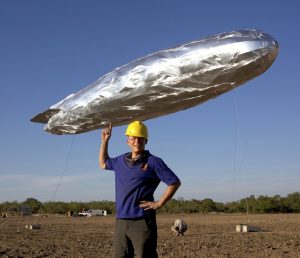 STEVE WOLF
STEVE WOLF
Stunt Scientist, Experience Engineer, Inventor, TV Producer, Science Presenter and Author
https://www.stevewolf.info/bio
https://www.scienceinthemovies.com
“If there’s anything you want to learn, anything you want to be, find someone you respect who is doing it well, and put yourself next to them. Maybe you won’t get paid at first, but you’ll be creating an opportunity for yourself that no amount of schooling or money can rival. People hire people they know, like and trust. So, get known, be likeable, be trustworthy and doors will open for you.”
Do you have a question for Steve?


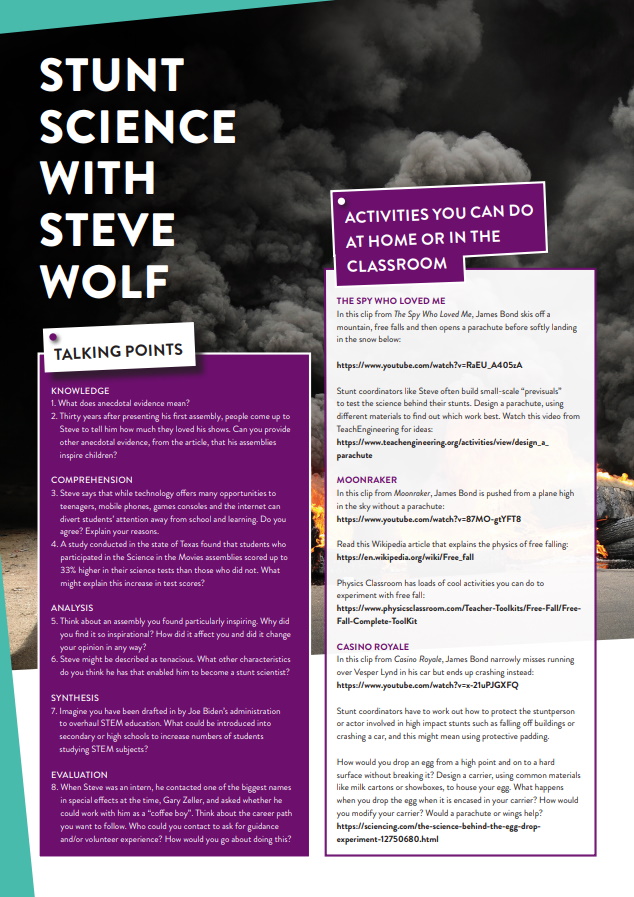
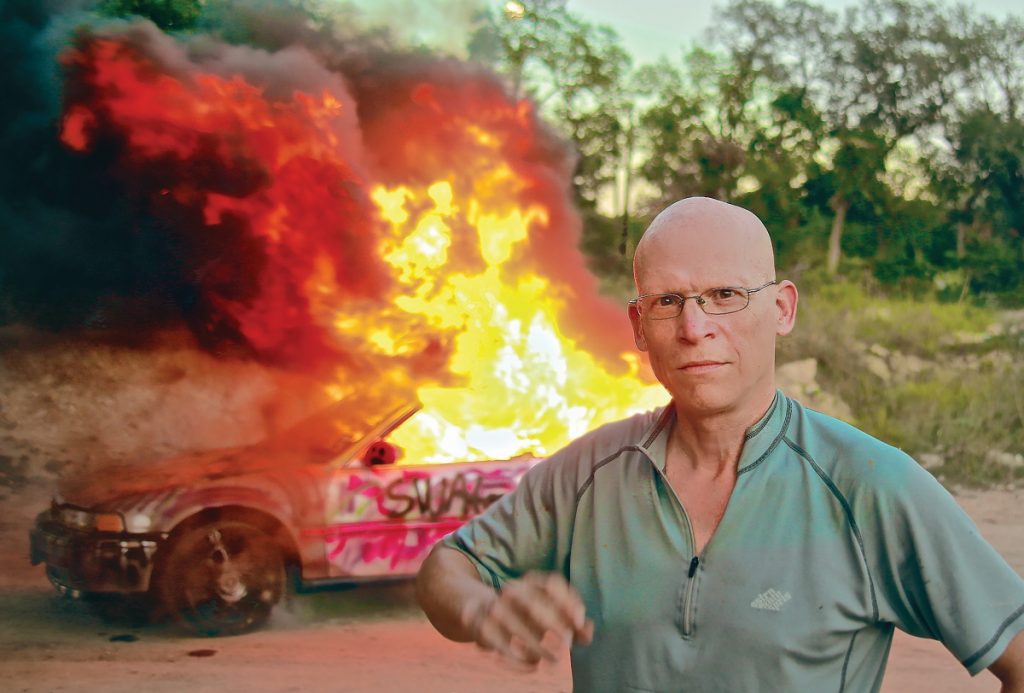
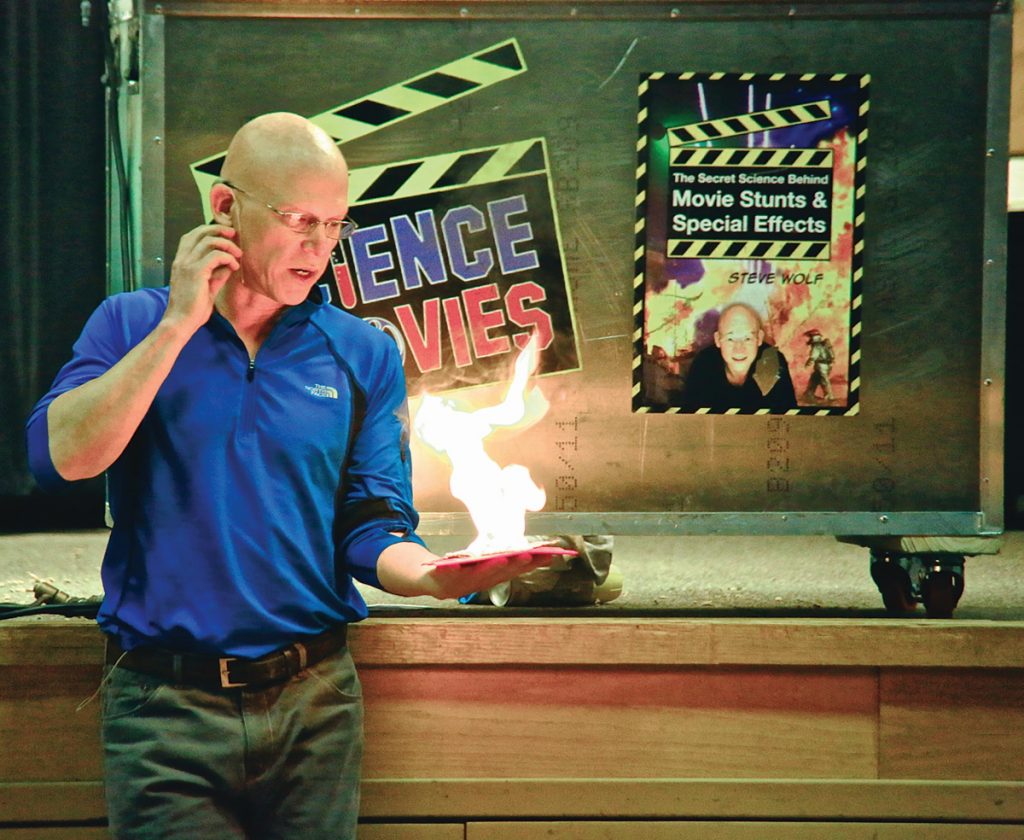

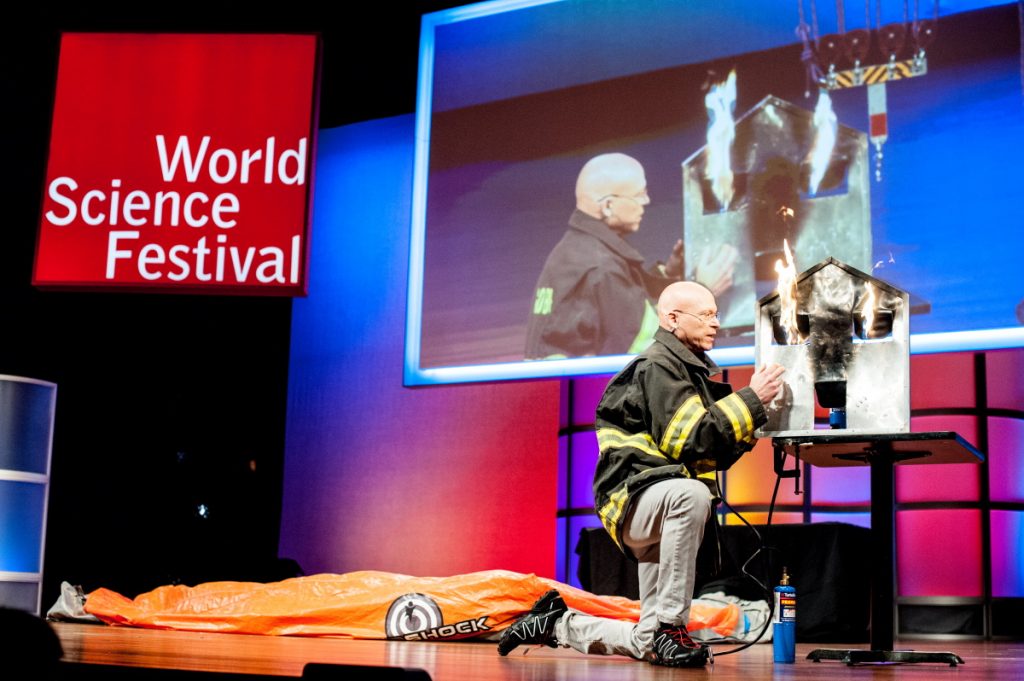
This is a great thing to do. I worked with Steve on a short film, “Bending Light,” written by a student.
I was inspired to become an engineer because of a series of fiction stories, “Carl & Jerry,” in Popular Electronics magazine in the late ’50s and early ’60s. In fact one of the stories prompted me to build a light seeking robot. It was in 1964 when I was 14 years old. Here’s a link to the story I wrote about this adventure and there’s a picture of my robot.
Link to story: “Inspiration to Become an Engineer” https://www.shavers.page/post/inspiration-to-become-an-engineer